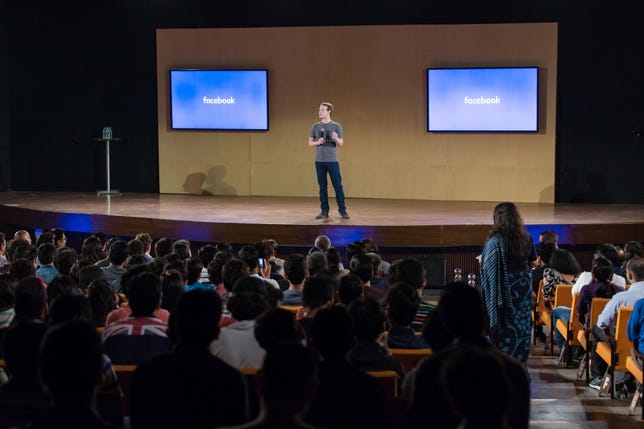Mark Zuckerberg is not backing down from his quest to provide Internet service across India.
The Facebook CEO responded to critics of the company’s controversial Free Basics service on Monday with an opinion piece in the Times of India. He compared free but limited Internet service to access to libraries and hospitals. While libraries “don’t contain every book,” he wrote, “they still provide a world of good.” And while public hospitals don’t offer every treatment, “they still save lives,” he added.

Facebook CEO Mark Zuckerberg discusses the need for more Internet access in India during a town hall session in New Delhi in October.
Facebook
Zuckerberg has been on a mission to provide Internet service to underserved parts of the globe like India, parts of Asia and Africa. With 132 million Facebook users, India’s user base is second only to the United States’ 193 million monthly active users.
Emphasizing the “free” aspect, the Menlo Park, California-based company in late September changed the name of Internet.org, its website offering free Internet services, to Free Basics.
Zuckerberg’s editorial piece in India’s largest newspaper comes after that country’s Telecom Regulatory Authority requested that the only company offering Free Basics put a halt to the program.
Related links
- Facebook’s freebie Internet service comes under fire in India
- Zuckerberg: We have a ‘moral’ obligation to connect India to the Internet
- Facebook goes slo-o-ow with ‘2G Tuesdays’
During the past year, Free Basics has gone online to more than a billion people in 30 countries. Critics claim the free service is violating the principles of Net neutrality by favoring content from Facebook over other content. During a visit to India in October — his second trip there this year — Zuckerberg said in a question and answer session that all traffic on the Internet should be treated equally.
Zuckerberg on Monday again accused his critics of spreading false information and said Free Basics is consistent with Net neutrality. “Instead of wanting to give people access to some basic Internet services for free, critics of the program continue to spread false claims — even if that means leaving behind a billion people,” he said.
“Who could possibly be against this?” he added. “Choose facts over false claims. Everyone deserves access to the Internet.”




